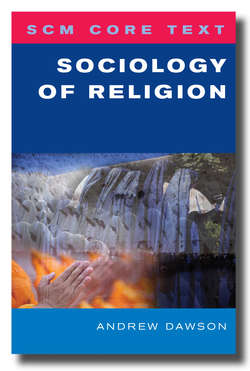SCM Core Text Sociology of Religion

Реклама. ООО «ЛитРес», ИНН: 7719571260.
Оглавление
Andrew Dawson. SCM Core Text Sociology of Religion
SCM CORE TEXT. Sociology of Religion
Published in 2011 by SCM Press
Contents
Acknowledgements
Introduction
Settling into the Discipline: Thinking Sociologically. Introduction
Modernity
Key characteristics of modern society
Late modernity
Society
Key dimensions of society
Agency–structure relations
Social determination
The sociological gaze
Variations on a sociological theme
Theoretical variations
Scientific status
Applied methods
Conclusion
Further reading
Note
Religion in Sociological Perspective
Defining religion
Substantive definitions
Functional definitions
Mixed definitions
Practitioner perspectives
Polythetic definitions
Approaching religion
Academic approaches
Religion in social context
Micro-social dimension
Institutional dimension
Macro-structural dimension
Methodological considerations
Shifting sands
Further reading
Notes
The Classical Legacy: Marx, Durkheim. and Weber. Introduction
Karl Marx (1818–83)
Historical materialism
Situated knowledge
Conflictual society
Religious critique
Religious mystification and ideological sanction
Émile Durkheim (1858–1917)
God and society are one
Religion as classificatory, regulatory and cohesive
Max Weber (1864–1920)
Self and society
Elective affinity
Religion and society
The capitalist mindset
Religions east and west
Conclusion
Further reading
Notes
Religion Down and Out? Theories of Secularization. Introduction
The classical legacy
Émile Durkheim
Undermining traditional religion
The rise of rational morality
Max Weber
Technocratic reason and disenchantment
Modern recapitulations
Bryan Wilson
Modern de-mystification
Peter Berger (the early version!)
Traditional plausibility
Modern implausibility
Contemporary variations on a classical theme. Steve Bruce
Secularizing dynamics
Multidimensional secularity
David Martin
Theoretical contingency
Contextual variability
Karel Dobbelaere
Conclusion
Further reading
Notes
Neither Down nor Out? Ongoing Religiosity in Modern Society. Introduction
Traditional religious vitality
Public religion
Religious relocation
Invisible religion
Civil religion
Common religion
Spiritualities of life
The sociology of spirituality
Spiritual but not (necessarily) religious
Public spirituality
Conclusion
Statistical significance and definitional latitude
Theorizing spirituality
Further reading
Notes
Religion, Ideology and Gender
Classical trajectories
Karl Marx
Ideological domination
Émile Durkheim
Max Weber
Modern developments
North American functionalism
Non-functionalist approaches
The emancipatory paradigm
Gendering religion
Emic/insider critiques of gendered religion
Religion and gender in social-scientific perspective. Spirit possession
Conservative religion
Conclusion
Further reading
Notes
‘In with the New’: New Religiosities in Sociological Perspective. Introduction
Understanding new religions
Classificatory approaches
Church, sect and cult
Modern adaptations
Typological limitations
NRM theory
Worldly orientations
Contributory factors
Macro-structural conditions
Institutional contributions
Micro-social processes
Conclusion
Further reading
Notes
Religion for Sale: Market Dynamics and Contemporary. Religiosity. Introduction
The marketization paradigm. Peter Berger
Thomas Luckmann
Marketized religion in contemporary perspective
The Alpha Course
A New Age marketplace
The religious economy model
Anthropological constants
Concrete applications
Institutional endeavours
Environmental dynamics
Transactional relations
Conclusion
Further reading
Notes
Religious Fundamentalisms: Religion Ancient and Modern? Introduction
Defining fundamentalism
A reactionary phenomenon
Other key traits
Ideological and organizational characteristics of fundamentalism
Ideological traits
Organizational characteristics
Fundamentalist movements
Religious nationalism
Fundamentalism in action
Worldly orientations
Conclusion
Further reading
Notes
Globalization, Religion and Modernity. Introduction
Globalization defined
Globalized religion
Global Christianities
New religious globalities
Migratory dynamics
Macro-structural implications
Virtually global
Globalizing modernity
Multiple modernities
Latin American mixed modernity
Theorizing modernity
Conclusion
Further reading
Notes
Bibliography
Index
Отрывок из книги
Andrew Dawson
Introduction
.....
The tendency of social processes to influence human beings in ways which escape their immediate notice has sociological implications that go beyond some of the theoretical abstractions of the determinism debate. This is the case because structural determination generates patterns and regularities in human behaviour which impact directly upon the life choices made by and social opportunities available to every individual. As Jonathan Turner notes:
The symbolic and material resources available to individuals, the placement of people in space, the amount of time people have, the options that are realistically available, and just about everything that is possible in a micro encounter are all dictated by macrostructure. (1988, p. 211)
.....